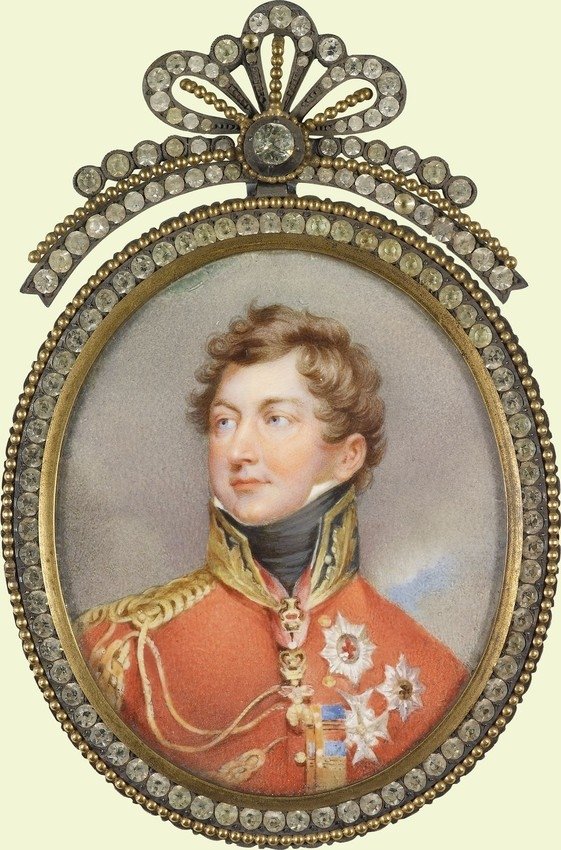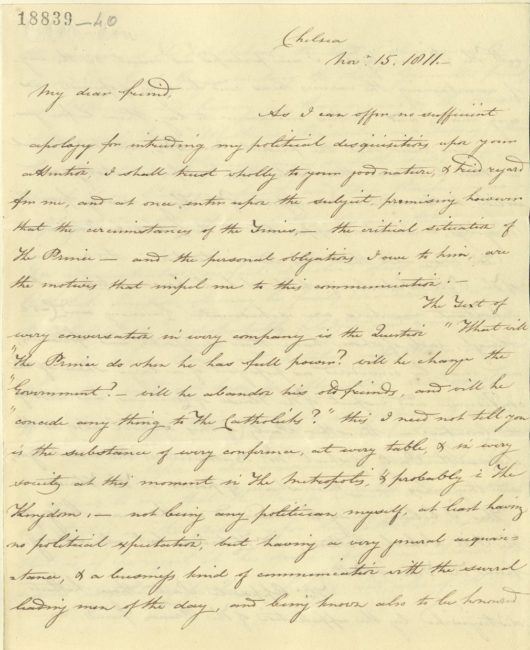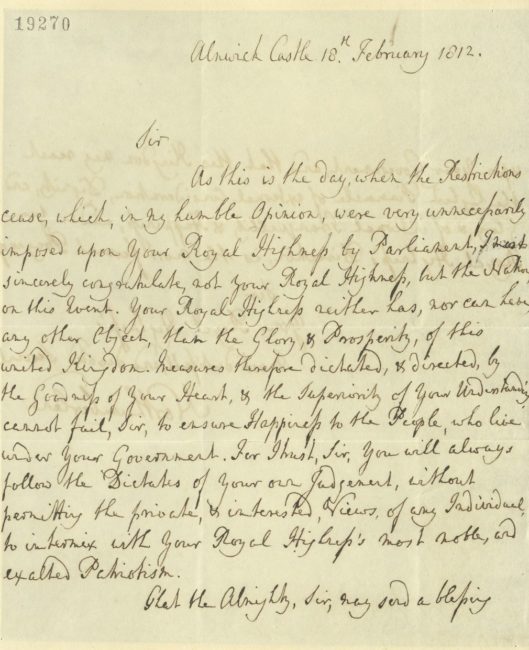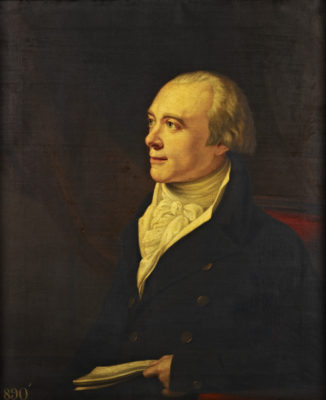
George VI when Prince Regent. RCIN 422432 ©
George, Prince of Wales became Regent of the United Kingdom of Great Britain and Ireland on the 6th February 1811 and, although initially restricted, it finally provided him with an official role. Under the terms of the Regency Act, 1811, the Prince would ‘assist the King’ having ‘full power and authority in the name and on behalf of His Majesty’. However this duty came with conditions: the Regency would be terminated when the King was restored to health; he was required to swear allegiance to the King; relinquish the care of the King and the King’s household to the Queen (for which a Queen’s council would be appointed); and that his own powers would be restricted until February 1812. Ultimately the Act bestowed responsibility upon the Prince without executive power, a situation noticeable within the correspondence where letters received do not usually ask for his advice or opinion, but merely keep him informed of affairs, or simply request him to sign and return their enclosures.
For a large proportion of these papers this is the first time they have been made widely available (it is estimated as many as 60% have not previously been published), although scholars have been able to access the original material by visiting the Royal Archives. Currently the papers comprising the first year of Regency, 1811- 1813, have been published, with subsequent years to be made available as the Georgian Papers Programme progresses.
These papers reveal little of the Prince’s own thoughts and beliefs, due to the majority being written to rather than by him, but despite this lack of insight they are a rich source of information he was privy to, such as parliamentary reports, treasury papers, and military intelligence, especially in relation to the Napoleonic Wars. One prevalent correspondent in terms of foreign affairs is the Duke of Northumberland, and in one letter sent to Colonel McMahon (the Prince’s Private Secretary), dated 9th April 1811, the Duke writes that Lord Wellington was ‘so close to Napoleon, that he may attack him when he pleases; which will probably be during Napoleon’s attempt to cross the Alva’. This meeting (which had already taken place at the time of writing) was, as Northumberland predicted, a great success for Wellington.

Letter from Colonel James Willoughby Gordon to Colonel John McMahon concerning the Regency, 15 November 1811. RA GEO/MAIN/18839-18842 Royal Archives/© Her Majesty Queen Elizabeth II 2019
In addition to intelligence, George III’s health is unsurprisingly a regular topic of discussion, as his recovery would lead to a termination of the Regency. These documents, often showcasing the confusion and concern around the King’s condition, include letters from the King’s ministers and physician’s medical reports. However, due to a worsening of the King’s condition in July 1811 the question of when the King might recover was abandoned. In a letter that same month to Colonel McMahon, Lord St. Vincent stated it was ‘evident that the physicians despair of restoring mental faculties’ and that ‘the state of the patient is truly lamentable’. This was supported by a statement given by the physician Matthew Baillie during his examination by committee on I0 January 1812. Interestingly none of the physicians interrogated would admit to the King’s case being ‘hopeless’, and all felt that although his mind was afflicted he could still live a long life (GEO/MAIN/19079-19095).
The state of the King’s health understandably impacted upon the government. The Prince did not wish to alter his father’s ministers whilst it was still thought the King could recover, and the correspondence showcases the ever-present uncertainty surrounding the issue, particularly in relation to what form the government would take after the end of the restricted regency. This complex issue was not aided by the Prince’s strained political relations. In an attempt at political neutrality after the death of Charles James Fox in 1806 he had distanced himself from his former political allies, the Whigs, but had also continued to withhold his confidence from the Tories, leading to the alienation of both.

Letter of congratulations from the Duke of Northumberland to the Prince Regent, 18 February 1812. RA GEO/MAIN/19270 Royal Collection Trust /© Her Majesty Queen Elizabeth II 2019
The confusion regarding political allegiances was closely intertwined with the issue of Ireland, which features heavily within the papers. James Willoughby Gordon believed that the government ministers ‘use their situations, and power, wholly to support the King, arising from His Majesty’s conscientious opposition to the Catholick Petition’. Since the Prince had, before his self-imposed neutrality, been a supporter of the Petition, Gordon thought he ‘stands between these two parties, as the arbiter upon the Catholick Question’ and, ‘if he rejects it, he draws upon him… the united hostility of his former friends’.
By November 1811 the question transfixing the kingdom was what would happen after the regency restrictions ended. James Willoughby Gordon voiced these concerns to Colonel McMahon, writing ‘What will the Prince do when he has full power? will he change the government? – will he abandon his old friends, and will he concede anything to the Catholicks?’.
The Prince’s position became clear in the final days of the restricted Regency with his admission of support for the Catholic Relief Bill, but this did not mean the measure could be passed and actively supported. The Prince declared that as he was acting on behalf of the King (who did not support the Bill believing it to be in conflict with his oath) the matter would have to be postponed until he reigned in his own right. This was perceived as an increasing allegiance, and alignment of ideas, with the existing government. Nevertheless the Prince still strove to avoid being partial to either political party and to create a cohesive coalition. He offered government positions to Charles Grey and William Grenville, but their refusal made it necessary to abandon this idea and continue with the existing government.
The correspondence from the first months of 1812 demonstrate the mixed emotions surrounding the Prince Regent and his chosen government. One who embraced the new state of affairs was the Duke of Northumberland who wrote a letter of congratulations to the Prince on 18 February 1812 stating ‘the goodness of your heart, & the superiority of your understanding cannot fail, sir, to ensure happiness to the people, who live under your government’. However Lord Moira was less optimistic, voicing his disappointment at the Prince’s abandonment of his Whig supporters in favour of the Tory government, writing ‘it grieves me to the soul’ the ‘unexplained departure from all those principals which you have so long professed’. Irrespective of the diverse public opinion the unrestricted regency began on the 17th February and it fell to the Prince Regent and Spencer Perceval to navigate this new era together.
The Prime Minister Spencer Perceval led the Tory government until his assassination at the Houses of Parliament on the 11 May 1812. The document detailing the indictment of John Bellingham for the Prime Minister’s murder, entitled ‘The King verses John Bellingham, 15th May 1812’, can be found within the official papers and includes witness testimonies, verdict, and Bellingham’s sentence. After Perceval’s death a period of uncertainty ensued, which is reflected by the extensive correspondence deliberating upon the form of the new administration, including Lord Wellesley’s letter to the Prince Regent on the [25 May 1812] which touched upon the ever present subjects of the Napoleonic Wars and the Catholic Question. This uncertainty lasted until the 8 June 1812 when the 2nd Earl of Liverpool was appointment Prime Minster, a position he held until 1827, providing a point of stability throughout the Regency.

